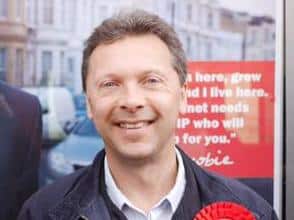
Thanet has the second highest child poverty rates in the south of England and the highest in Kent, according to a report released by Loughborough University on behalf of coalition End Child Poverty.
According to the research some 37% of youngsters aged under 16 on the isle are living below the poverty line after housing costs – equating to 9943 children. The ‘poverty line’ is defined as household income (adjusted to account for household size,) that is less than 60% of the median income.
In 2014/15 there were 34.9% of children in Thanet defined as living in poverty (after housing costs) compared to 37% in 2018/19. Data at ward level has not been released in the Loughborough report.
The new analysis shows child poverty rates have been relatively stable across the South as a whole, but they also show areas where the combination of low income and relatively high housing costs are creating levels of child poverty that are as high as the hardest hit parts of the country.
Separate data from Kent County Council shows 21.4% of Thanet children -5745- being defined as living in absolute low income households (before housing costs) – the highest level in Kent. KCC data does include some ward detail and shows almost half of the wards in Thanet (47.8%) and Dover (42.9%) are within the 20% of wards in Kent with the highest proportion of children in absolute low income families.
Top ten wards in Kent with highest percentage children in absolute low income families, 2018/19

Conditions are likely to have worsened in the last six months as the effects of the pandemic, including redundancies and shorter working hours, bite.
Cliftonville West ward councillor Alan Currie (pictured below) said: “When I recently helped out for a few months with Sharon Goodyers Our Kitchen free food deliveries I saw child poverty in Cliftonville West first hand, I would say three quarters of the households I delivered to were families with young children, I have been told that 70% of children living in poverty have at least one parent in work but this will change as the COVID situation and increased unemployment really takes effect as furlough schemes end and businesses are forced to let workers go. This will especially affect many in our area who work part time and on zero hour contracts.

County Councillor Karen Constantine added: “These figures are absolutely shocking. We know that child poverty blights lives. Children growing up in poverty are far less likely to keep pace with their more wealthy peers. As adults they will earn less, achieve less educationally and suffer poorer health. It is very concerning that social mobility in the UK has ground to a halt.
“Kent County Council has a responsibility to ‘level up’ across Kent to to ensure economic prosperity for all. Everyone should have an equal life chance. That’s clearly not the case for thousands of children in many parts of Kent. I’ll be calling on Kent County Council to do more, in particular with the potential for Covid to further compound poverty I’ll be requesting a child poverty ‘Select Committee’. This will provide the detailed insight we need to improve and focus Kent County Council policy to start to eradicate this blight.
“We must stop this trend and our County Council must now take urgent action. “
Buttle UK – which provides financial support direct to families and young people in crisis – has seen an increase of 145% in spend across the South since lockdown started compared with the same period the previous year. The charity funds a range of families’ costs through its Chances for Children grants. Since the crisis began, the most commonly funded items in the South have been: IT equipment (£82,956), educational toys and books (£26,008), clothing (£24,616) and home appliances (£21,324).
End Child Poverty, a coalition of organisations, is calling for an urgent Government plan to end child poverty including keeping the £20 uplift in Universal Credit introduced at the start of the pandemic, which the Government has indicated will end in April 2021; end the cap and the two-child limit on benefits and extend free school meals to all families in receipt of Universal Credit and those with no option for public funds.
Emergency fund
Buttle UK has now established the COVID-19 Direct Emergency Response for Children and Young People Fund in partnership with The National Lottery Community Fund and others, which delivers £2 million in National Lottery grants to support vulnerable children and young people, and up to £5m in total by March 31 2021.
The coalition is calling on the Government to recognise the scale of the problem and its impact on children’s lives. They are urging the Government to set out an ambitious plan to tackle child poverty encompassing not only social security spending but the high cost of housing and childcare and investment in children’s services.
Joseph Howes, CEO of Buttle UK and coalition partner saidd: “These new figures allow us to understand the true picture and unacceptably high levels of child poverty at the start of lockdown in the south. With the Government putting in new measures to control COVID-19, we need to brace ourselves for further bad news and what could be a massive increase in child poverty and ultimately a lost generation.
“Not all families were the same going into this crisis and they will certainly not be the same coming out. As we attempt a recovery from the crisis, there are going to be some very big challenges facing the most vulnerable sectors in society. Now is the time for the Government to take bold action and work with coalition members to ensure child centric strategies are at the heart of plans for the recovery”.
Anna Feuchtwang, Chair of End Child Poverty, said: “The Government can be in no doubt about the challenge it faces if it is serious about ‘levelling up’ disadvantaged parts of the country. This new data reveals the true extent of the hardship experienced by families on low incomes – the overwhelming majority of which were working households before the pandemic. The children affected are on a cliff edge, and the pandemic will only sweep them further into danger.
“The Prime Minister must urgently admit to the true extent of child poverty in our country rather than resorting to his own inaccurate statistics. An ambitious plan to put this shameful situation right would be transformational for millions of children. “As a matter of urgency, we are calling on the Chancellor not to go ahead with planned cuts to Universal Credit which would see families lose out on £1000 a year. Given today’s data, this cut is unconscionable.’
The top South constituencies with the highest increases in AHC (after housing costs) child poverty 2014/15 -2018/19. (BHC = Before housing costs)
| Local authority | % of children below 60% median income AHC | ||
| AHC | BHC | %age point difference (2014/15 – 2018/19 | |
| UK Average | 30% | 20% | 10% |
| Hastings | 37.8% | 25.5% | 12.3% |
| Thanet | 37.0% | 24.7% | 12.3% |
| Southampton | 34.7% | 21.5% | 13.2% |
| Dover | 34.0% | 21.4% | 12.6% |
| Portsmouth | 33.2% | 20.3% | 12.9% |
| Isle of Wight | 32.7% | 20.4% | 12.3% |
| Slough | 32.7% | 18.5% | 14.2% |
| Torridge | 32.6% | 19.8% | 12.8% |
| Eastbourne | 32.6% | 19.7% | 12.9% |
| Gravesham | 32.5% | 19.3% | 13.2% |

